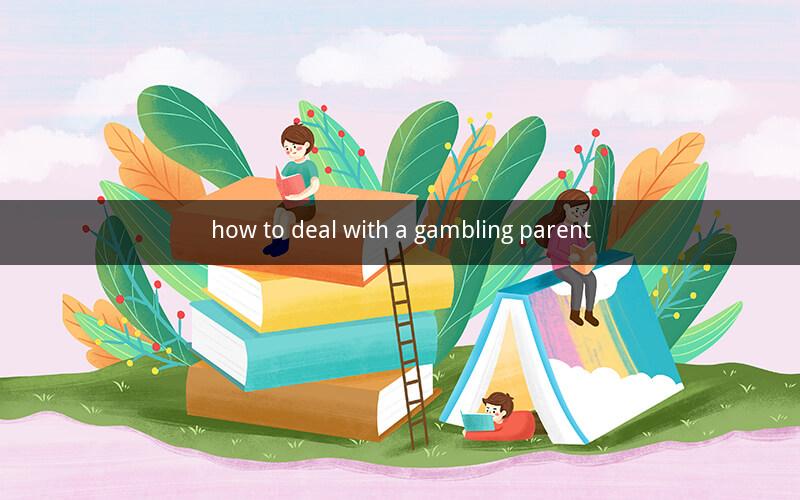
Table of Contents
1. Understanding the Problem
2. The Impact of a Gambling Parent
3. Communicating with a Gambling Parent
4. Encouraging Change
5. Seeking Professional Help
6. Support Systems for the Family
7. Self-Care for Those Affected
8. The Role of the Legal System
9. The Importance of Education
10. Case Studies and Success Stories
1. Understanding the Problem
Dealing with a gambling parent can be incredibly challenging. It is essential to understand that gambling is an addiction, and it is a serious issue that can affect the entire family. Recognizing the signs of gambling addiction is the first step in addressing the problem.
2. The Impact of a Gambling Parent
The consequences of a gambling parent can be devastating. It can lead to financial problems, strained relationships, and emotional turmoil. Understanding the impact of the addiction can help in developing a plan to cope with the situation.
3. Communicating with a Gambling Parent
Communication is key when dealing with a gambling parent. It is important to approach the conversation with empathy and understanding. Use "I" statements to express your feelings without placing blame. Be prepared for resistance, but stay firm in your stance.
4. Encouraging Change
Encouraging your parent to seek help is crucial. Suggest professional help, support groups, or counseling. Be supportive and offer to accompany them to appointments. Remember that change takes time, and it is essential to be patient.
5. Seeking Professional Help
Professional help is often necessary when dealing with a gambling parent. Therapists, counselors, and support groups can provide guidance and strategies for both the affected family member and the gambler. Research and find professionals who specialize in gambling addiction.
6. Support Systems for the Family
Building a support system is vital for the family. Reach out to friends, relatives, or support groups for individuals affected by gambling addiction. Consider joining a family therapy group to address the emotional and psychological effects of the addiction.
7. Self-Care for Those Affected
Taking care of yourself is crucial when dealing with a gambling parent. Practice self-care activities, such as exercise, meditation, and hobbies. Establish boundaries and seek support from friends and family to help you cope with the stress.
8. The Role of the Legal System
In some cases, the legal system may play a role in dealing with a gambling parent. If the addiction has led to illegal activities or financial crimes, consider seeking legal advice. However, it is important to remember that the primary focus should be on helping the addicted individual.
9. The Importance of Education
Educating yourself and your family about gambling addiction is crucial. Understanding the nature of the addiction can help in developing a more effective plan to cope with the situation. Learn about the warning signs, treatment options, and the potential consequences of gambling addiction.
10. Case Studies and Success Stories
Case studies and success stories can provide inspiration and hope when dealing with a gambling parent. Reading about others who have overcome similar challenges can help you realize that recovery is possible.
Questions and Answers:
1. How can I approach my gambling parent without causing a confrontation?
Answer: Use "I" statements to express your concerns without placing blame. Be calm, empathetic, and focus on your feelings rather than the actions of your parent.
2. What should I do if my parent is unwilling to seek help?
Answer: Encourage your parent to seek help by offering to accompany them to appointments, suggesting support groups, or counseling. Remain supportive and patient.
3. How can I protect myself from the financial consequences of my parent's gambling?
Answer: Establish boundaries, such as not providing financial support, and seek legal advice if necessary. Consider setting up a separate bank account for your own expenses.
4. Can a gambling addiction be cured?
Answer: While there is no guaranteed cure for gambling addiction, recovery is possible with the right treatment and support.
5. How can I support my parent during their recovery process?
Answer: Be patient, understanding, and supportive. Offer to accompany them to appointments, encourage them to attend support groups, and be there for them during difficult times.
6. Can a gambling addiction be passed down through genetics?
Answer: There is evidence to suggest that a genetic predisposition may increase the risk of developing a gambling addiction, but environmental factors also play a significant role.
7. What should I do if my parent's gambling addiction has led to legal issues?
Answer: Seek legal advice to understand your options and consider involving the legal system to address the addiction.
8. How can I cope with the emotional stress of having a gambling parent?
Answer: Practice self-care activities, such as exercise, meditation, and hobbies. Seek support from friends, family, or support groups for individuals affected by gambling addiction.
9. Is it possible for a gambling addiction to affect children?
Answer: Yes, a gambling addiction can have a significant impact on children, leading to emotional and psychological distress. It is important to seek support for the entire family.
10. What resources are available for families affected by gambling addiction?
Answer: There are various resources available, including support groups, counseling services, and family therapy programs. Research and find organizations that specialize in gambling addiction to find the best support for your family.